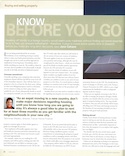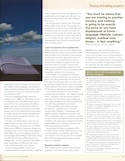Know before you go
You may click on each of the images below to download a larger version of the actual article as a PDF. You will need the free Adobe Reader application (installed on most computers) to view the file.
Know before you go
Heading off blindly to foreign country would seem pure madness without finding out some essential facts to help you prepare beforehand - therefore, it pays to invest some quality time in research before you make any long term decisions, says Jane Cahane
If you are being posted abroad for an overseas secondment, or are considering moving to sunnier climes to enjoy your hard-earned retirement, your first thought may not be to work out all the legal and tax implications of moving house. Nevertheless, this is clearly something you must do. The trouble is, where do you start, and is it possible to do it all yourself, or should you rely on the help and advice of dedicated experts?
Overseas secondment
Generally speaking, most companies that send their employees abroad will foot the bill for most if not all of the immediate expenses. They will also find you a property to live in, at least for the short term, relying on their own bilingual property search or relocation service contacts to help you find a place that is suitable for you. If you subsequently decide to search for a property yourself, you can either use the same property contacts again or find similar agents to guide you through the process.
Your employers will usually organise your visas and healthcare insurance provision (essential for any posting to the US), and ensure your income is paid and taxed appropriately.
For example, unless you are working for a UK company and will be paid in sterling and with UK taxes deducted, you are likely to continue to pay National Insurance contributions in the UK for the first 52 weeks only, after which you will switch to the tax system of your new country of residence. The same applies to any tax on income from your pensions and savings, although this may be complicated by other factors - check out www.hmrc. gov.uk for details on double-taxation agreements between the UK and other EU countries.
How soon the switch of residency occurs will depend on your new country's laws - for example, Spain considers you legally resident if you live there more than 183 days per year, whereas France considers you resident as soon as you arrive if your purpose is to live there. It is much harder to obtain residency in countries such as the US and Australia, so make sure you are clear on the procedures well before you go.
Another factor you may need to consider is what to do regarding any property you own in your country of domicile. If you are posted abroad but plan to return to the UK after your term of service, you will probably wish to rent out your UK property. However, being a landlord requires a certain commitment to maintaining the property in good condition as well as managing tenants, and there may be void periods when the property is not rented out, which could affect your mortgage repayments.
"As an expat moving to a new country, don't make major decisions regarding housing until you know how long you are going to stay. It's always a good idea to plan to rent
for at least three months as you get familiar with the neighbourhoods in your new city. " Tahminae Madani, director, France Home Finance
Your property will be subject to UK tax, and you are liable for UK inheritance tax (IHT) if your permanent home is in the UK. You should also be aware of changes to UK laws, such as the Tenancy Deposit Protection Act 2007, which is now a legal requirement for landlords in order to safeguard deposits made by tenants. Unless you are regularly returning to the UK or are able to manage the property through a family member, you should enlist the services of an estate agent or property letting service. You may decide, on balance, that you and your family will be better off selling your UK home and buying overseas for the duration of your posting, provided you buy a property with good resale potential.
Retiring abroad
Clearly, if you dream of retiring abroad, it makes sense to read up on and visit the area you like in advance to find out what the local amenities and infrastructure are like - particularly important is how close the property is to an airport with regular, low-cost flights. You should visit the area several times, speak to locals, get a feel for the area, and ensure you have been there in all seasons, as many shops or businesses may be closed after the tourists leave. Unless you are planning on living in an expatriate dominated area such as the Dordogne or the Costa del Sol, you will need to study the language and read up on local customs and etiquette. Even if you do feel confident with the language, you should seek expert, locally based bilingual advice before signing any contracts to ensure you understand the terms and conditions in full.
If you are considering starting a business or owning a bar or a B&B, you will need to read up on employment laws. You will also need to get to grips with how the social security and healthcare systems work. You can research this yourself on the internet or speak to professional overseas legal advisers, such as Live Overseas/Key4 International, a company that provides locally based legal advice for several countries around the world (see www. key4international.com).
Of course, you will also have to ensure you are organised before you leave home. This not only involves putting your UK property on the market (which may be difficult in the present climate), but ensuring you have sorted out how you are going to obtain finance for your new property abroad. As your mortgage will probably be in the local currency, you will need to be aware of fluctuations in the exchange rates - and that some areas, like southern Spain, are perhaps more affected by the current 'credit crunch' than others, such as France.
Because lending conditions may be more complicated abroad, it may be advisable to apply for your mortgage well in advance of ending your UK employment, as the foreign banks will need to see that you are solvent before they will be willing to lend to you.
You will also need to wind up your UK tax and financial affairs before you go - for example, you should phone the Pension Service (0845 606 0265) to discover if your state pension can be paid into an overseas bank account. You should ensure that you have sent in your P45 to your local tax office if you are working, and also complete a P85 form for moving abroad, both of which are downloadable from www.hmrc.gov.uk.
Types of properties and associated risks
Buying a property to rent out will be different from buying a property to live in. You may desire to settle in an area that is less in demand for rental purposes, or where there is already a glut of properties in the rental market, so it is essential that you aim for a property that will give you good returns in the short term until you are ready to relocate there permanently. It is a good idea to check with local estate agents to find out what is a reasonable, locally comparable rental price for your property.
If, for example, you are interested in buying a property in France and letting it out until you are able to retire there permanently, you may discover that, under French property laws, you cannot easily get rid of your tenants. You also need to be aware of French inheritance laws, which include an automatic 50- 50 property split between spouse and children.
Or you may be attracted to an area where the properties look like bargains - say, a Black Sea coastal resort - and discover that what seemed a pristine beach apartment has become a giant building site with a huge oversupply of new-built properties with low resale value and reduced rental returns.
A frequent problem with off-plan retirement developments - especially ones in newer EU countries such as Bulgaria - is ensuring that the building company is regulated and that the work - will be completed on time. It is essential to scrutinise contracts to ensure you understand all the terms and conditions, such as the deposit required and whether it is refundable, what is included in the price and when stage payments are required.
Some property development companies offer a 'try before you buy' scheme, which may be one way to be sure whether you really like a place before you commit to it for the long term, but you should always check any agreements to ensure you know what you are liable for.
Research, Research, Research
With so many issues to consider, it may seem that preparing to move abroad is like trying to walk blindfold across a series of moving rocks over a fast-flowing stream. However, if you find out as much as you can before you go, and keep abreast of developments, this need not be disastrous - in fact, it could be a tremendously positive and exciting time for you and your family, the beginning of a whole new adventure. The only problem may be keeping your old neighbours from moving in next door .









